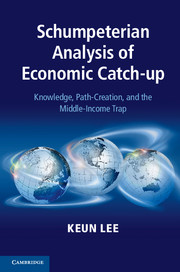Book contents
- Frontmatter
- Contents
- List of Figures
- List of Tables
- Foreword
- Preface
- Part I Introduction and perspectives
- 1 Introduction
- 2 Knowledge as a key factor for economic catch-up
- Part II Empirical analysis at three levels
- Part III Toward a theory and how to escape the trap
- Part IV Technological turning points and conclusion
- Appendix tables
- Notes
- Bibliography
- Index
1 - Introduction
from Part I - Introduction and perspectives
Published online by Cambridge University Press: 05 June 2014
- Frontmatter
- Contents
- List of Figures
- List of Tables
- Foreword
- Preface
- Part I Introduction and perspectives
- 1 Introduction
- 2 Knowledge as a key factor for economic catch-up
- Part II Empirical analysis at three levels
- Part III Toward a theory and how to escape the trap
- Part IV Technological turning points and conclusion
- Appendix tables
- Notes
- Bibliography
- Index
Summary
The motivating question: sustaining the catch-up
While the rapid economic growth achieved by the newly industrialized economies in East Asia is widely appreciated, there has been concern recently about why such a “catch-up” is not happening elsewhere. Despite high levels of development aid, policy changes, and reforms along the lines suggested by the “Washington Consensus,” poverty prevails in many countries, the gap between rich and poor countries is widening, and many middle-income countries are not living up to expectations. One reason why good policy prescriptions, such as opening up of the economy for international integration, may fail is argued to be poor institutional conditions, including insecure property rights, and an absence of the rule of law. Thus, the recent literature on economic development has debated the relative importance of institutions, policy, and geography as competing determinants of economic growth, or as factors that contribute to a possible reversal of the fortunes of former colonies and other Third World countries. A stream of research has emerged that verifies the importance of institutions, and has become influential to a certain degree. This “institutional supremacy” view has provided a theoretical justification for “second-generation” reforms and led to the so-called augmented Washington Consensus, which replaced the original Washington Consensus that had lost credibility.
The augmented Washington Consensus includes additional elements such as corporate governance, anti-corruption measures, flexible labor markets, compliance with World Trade Organization agreements, financial codes and standards, the prudent opening of capital accounts, non-intermediate exchange-rate regimes, independent central banks, inflation targeting, and social safety nets. These elements remain a part of a “shopping list,” rather than a “recipe,” for successful development. Rodrik (2006) contends that the augmented Washington Consensus emphasis on institutions is its fundamental weakness, because even the most ambitious efforts at institutional reform can be faulted ex post for leaving something out. He also observes that the cross-national empirical literature has failed to establish a strong causal link between the implementation of any particular feature in an institution and sustained economic growth. Criticism of the relevance of institutions has also emerged in view of the questionable robustness of the proxy variables used to measure the degree of institutional development. Furthermore, Glaeser et al. (2004) propose that human capital is a more robust variable for long-term economic growth.
- Type
- Chapter
- Information
- Schumpeterian Analysis of Economic Catch-upKnowledge, Path-Creation, and the Middle-Income Trap, pp. 3 - 24Publisher: Cambridge University PressPrint publication year: 2013



